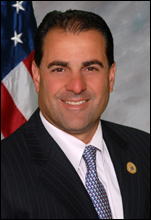 On Tuesday, February 23, 2016, the Bergen County NAACP will host a public forum to discuss proposed legislation that seeks to prevent public access to all police camera recordings and 911 calls. The forum, which is open to all, will begin at 7 p.m. at the Teaneck High School Media Center at 100 Elizabeth Avenue.
On Tuesday, February 23, 2016, the Bergen County NAACP will host a public forum to discuss proposed legislation that seeks to prevent public access to all police camera recordings and 911 calls. The forum, which is open to all, will begin at 7 p.m. at the Teaneck High School Media Center at 100 Elizabeth Avenue.
At issue is Senate Bill 788, sponsored by Senator Paul A. Sarlo (D-Bergen/Passaic), which would amend the Open Public Records Act (OPRA) so that "law enforcement camera recordings" and "9-1-1 audio recordings or transcripts" could not be disclosed to the public. Specifically, S788 would add the following two exceptions to OPRA:
- law enforcement camera recordings, except for use by any person authorized by law to have access to the recordings or for use by any government agency, including any court or law enforcement agency, for purposes of the administration of justice;
- 9-1-1 audio recordings or transcripts of a 9-1-1 call;
In today's world, police are increasingly using cameras (particularly dashboard-mounted cameras in patrol cars and body cameras worn by officers). Video from those cameras, which is an objective--and sometimes the only objective--record of police encounters with the public, is a valuable tool for those who want to hold police accountable to the public they serve. Sarlo's bill would block individuals and private organizations from accessing police recordings and would restrict such access to law enforcement and other government agencies.
In his February 8, 2016 letter to Bergen NAACP President Anthony Cureton, Sarlo attempted to justify the bill. Sarlo's letter, however, is erroneous in at least three respects.
First, Sarlo claims that the legislation's "two main goals" are to a) protect the privacy of those who appear on the recordings and b) "make it easier for people who are recorded to obtain their own recordings." Yet, there is nothing in the text of the bill that makes it "easier" for people "to obtain their own recordings." Rather, the bill prohibits disclosure of these records to everyone outside of government.
Second, Sarlo claims that he agrees "100% with people who want police recordings . . to weed out bad officers." He then states that his bill will foster police accountability by allowing the people who are in the police recordings to obtain those recordings. According to Sarlo, police accountability will not be hobbled by his bill because the people who are in the recordings (or their next of kin) will be "free to do whatever they want with [the recording] including giving it to the press or posting it on social media."
As stated above, Sarlo's bill does not give those who appear in police videos access to those recordings. But even if it did, it is doubtful that many people captured in police videos where police wrongdoing occurred would obtain the videos for the media or post them on-line. Those people, likely fearful of police retaliation, would probably shy away from submitting an OPRA request to very police departments that they believed victimized them.
Better policy would be allow all people and organizations access to otherwise non-exempt video recordings and 911 calls. This way, public interest groups such as the American Civil Liberties Union and the New Jersey Libertarian Party's Police Accountability Project could access video recordings of police encounters and bring incidents of suspected police wrongdoing to public light.
Third, Sarlo claims that police videos, if disclosed, could violate a citizen's reasonable expectation of privacy. As an example, Sarlo relates his family's own 911 call when he suffered a severe medical emergency at home. Sarlo states:
The 9-1-1 recording would have recorded my wife, scared and emotional, graphically describing my condition and symptoms to the 9-1-i operator. The recording from the police officer's body camera, if he had been wearing one, would have shown me lying halfdressed and unconscious on my bedroom floor, then being shocked to life with the AED and then being administered CPR by the officer. I thought about how emotionally scarred my wife and children would be if these recordings appeared in the news media or were posted on social media.
But, Sarlo's bill would place all police videos off limits, even those that capture police encounters that occur on a public sidewalk or other public place where those in the videos have no expectation of privacy.
And, Sarlo's privacy concerns are already addressed by current law. OPRA, specifically N.J.S.A. 47:1A-1 states that "a public agency has a responsibility and an obligation to safeguard from public access a citizen's personal information with which it has been entrusted when disclosure thereof would violate the citizen's reasonable expectation of privacy." In cases where a person's privacy may be violated by disclosure of a public record, New Jersey courts have held (see, e.g. Burnett v. County of Bergen, 198 N.J. 408, 422-23 (2009)) that courts must balance OPRA's mandate of disclosure with its protection of privacy. The balance requires the court to consider seven factors including "the potential for harm in any subsequent nonconsensual disclosure" before deciding whether or not to release a record.
In sum, Sarlo's bill would do nothing to foster transparency and would not protect personal privacy any more than it is already protected by current law. Rather, S788 would simply keep the public in the dark about that which is recorded on police videos and 911 calls.